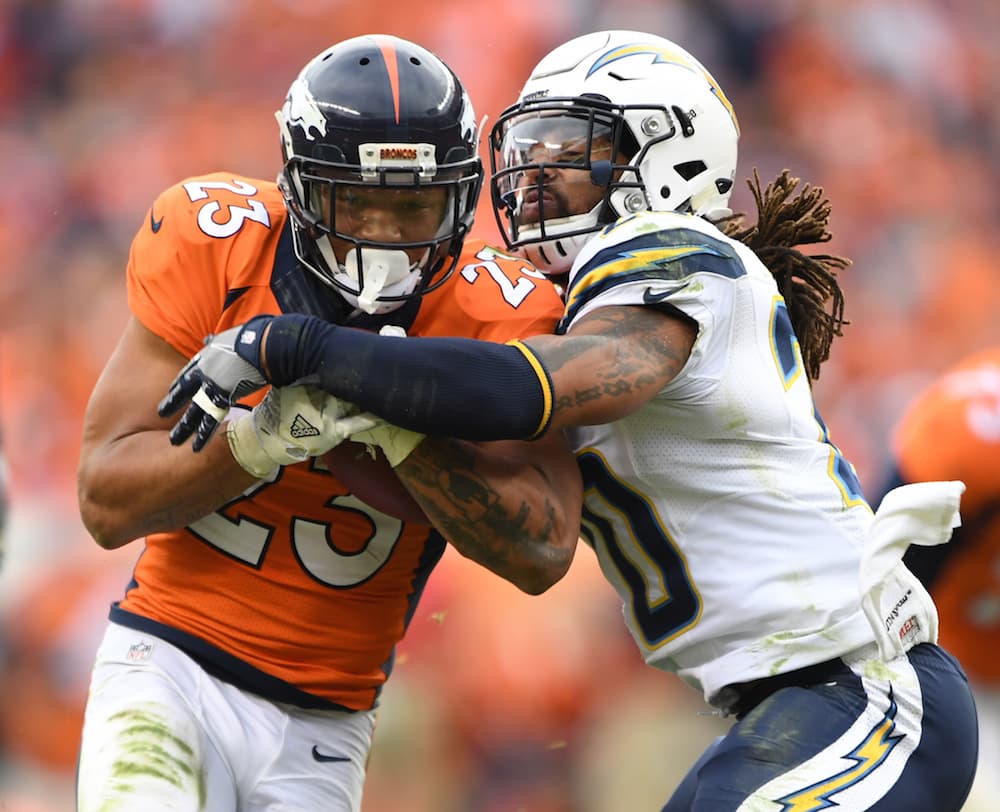
A lot of folks have opinions about why the Denver Broncos missed the playoffs in 2016. Some cited mediocre quarterback play. Others pointed out that while Denver's pass defense remained a nightmare for opponents, the Broncos' run defense fell off.
Both are valid points. But if you had to pinpoint one reason why the Broncos aren't in the postseason for the first time since 2011, look no further than the running game. Denver finished the season 27th in rushing yards per game (92.8) and 28th in yards per carry (3.6).
The Broncos racked up 1,484 total yards on the ground. To find a worse single-season output in franchise history, you have to go all the way back to 1994. Defensive coordinator Wade Phillips was the Broncos' head coach then. That year, the Broncos finished with 1,470 rushing yards. Denver went 7-9 and missed the playoffs. Phillips was fired at season's end.
It took 22 years — or to put in another way, enough time for Phillips to hold jobs with five teams who weren't the Broncos and then return as Broncos' defensive coordinator — for Denver to have a worse rushing attack.
Denver was a different team without C.J. Anderson
Veteran running back C.J. Anderson went down in late October with a right knee injury. He had to have the meniscus repaired and was placed on the injured reserve. His last game came in Week 7 against the Houston Texans when Denver rushed for 190 yards on 35 carries. It was not a coincidence that was the last time Denver's ground game looked competent.
Check out the Broncos' rushing splits before Anderson went down and after:
The run game fell off a cliff without him. Denver rushed for 57 yards on 25 carries in its first game without Anderson. Afterward, former head coach Gary Kubiak called the rushing attack "non-existent." It didn't improve much from there on out. The Broncos hit the 100-yard mark just four times in the nine games they played without Anderson.
So who's at fault?
Well, there's plenty of blame to go around. The reserve running backs on the roster were bad as was the Broncos' much-maligned offensive line.
Rookie Devontae Booker, a fourth-rounder out of Utah, struggled when he was asked to shoulder the brunt of the load. He finished with 174 carries at 3.5 yards a pop and four touchdowns. Out of the 42 players who received 100 carries or more, Booker ranked 36th in yards per carry average. He showed impressive power the few times he did discover some daylight in the second level. But the problem was he didn't make it there often.
Booker's offensive line didn't give him much help. Signing Russell Okung and Donald Stephenson to play the offensive tackle slots didn't pan out. Inside, guards Max Garcia and Michael Schofield got pushed around. Only the Seahawks and Giants devoted fewer financial resources toward their offensive lines than the Broncos in 2016, per OverTheCap.com. That cheap approach was evident.
Denver running backs were tackled at or behind the line of scrimmage 21 percent of the time, according to Football Outsiders, which put the Broncos 20th in the NFL. Football Outsiders also keeps tabs on a statistic called "power success," which is defined as the percentage of runs on third and fourth down with two yards to go that end in a first down or a touchdown. The Broncos converted just 51 percent of such plays, the fourth-worst percentage in football.
To put it succinctly: The Broncos' backup running backs — Booker, Kapri Bibbs and later in the season, Justin Forsett — didn't do nearly enough to create yards when Anderson went down. And Denver's offensive line didn't do nearly enough to help create them.
The result was the worst Broncos' running game since the Boyz II Men and Toni Braxton era.
Subscribe to Denverite's weekly sports newsletter here.












